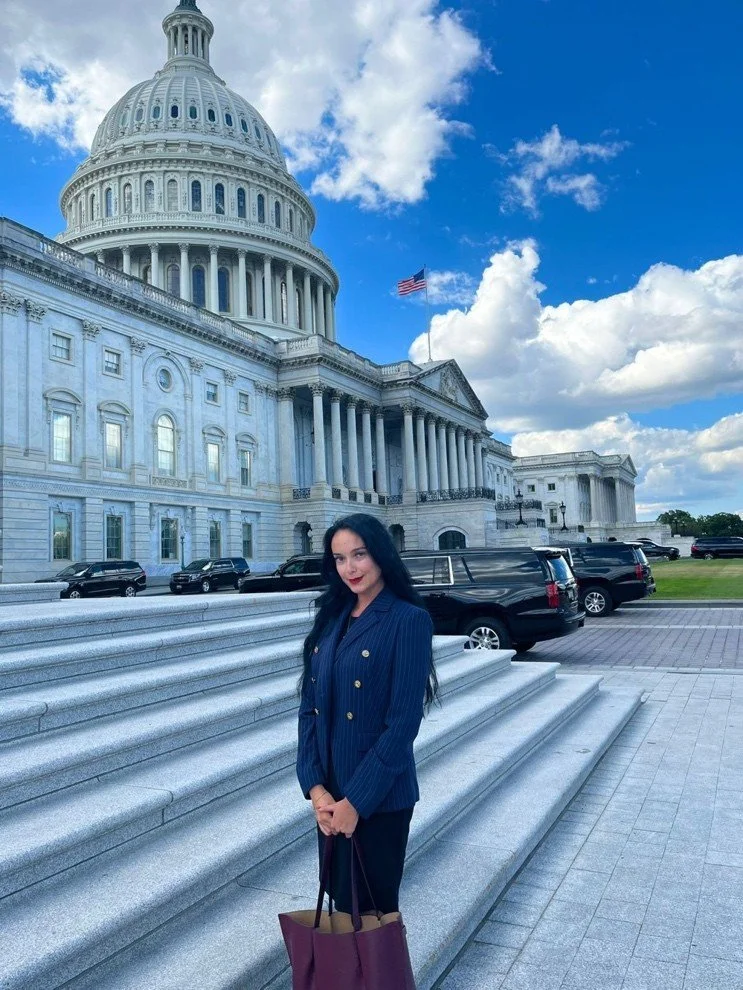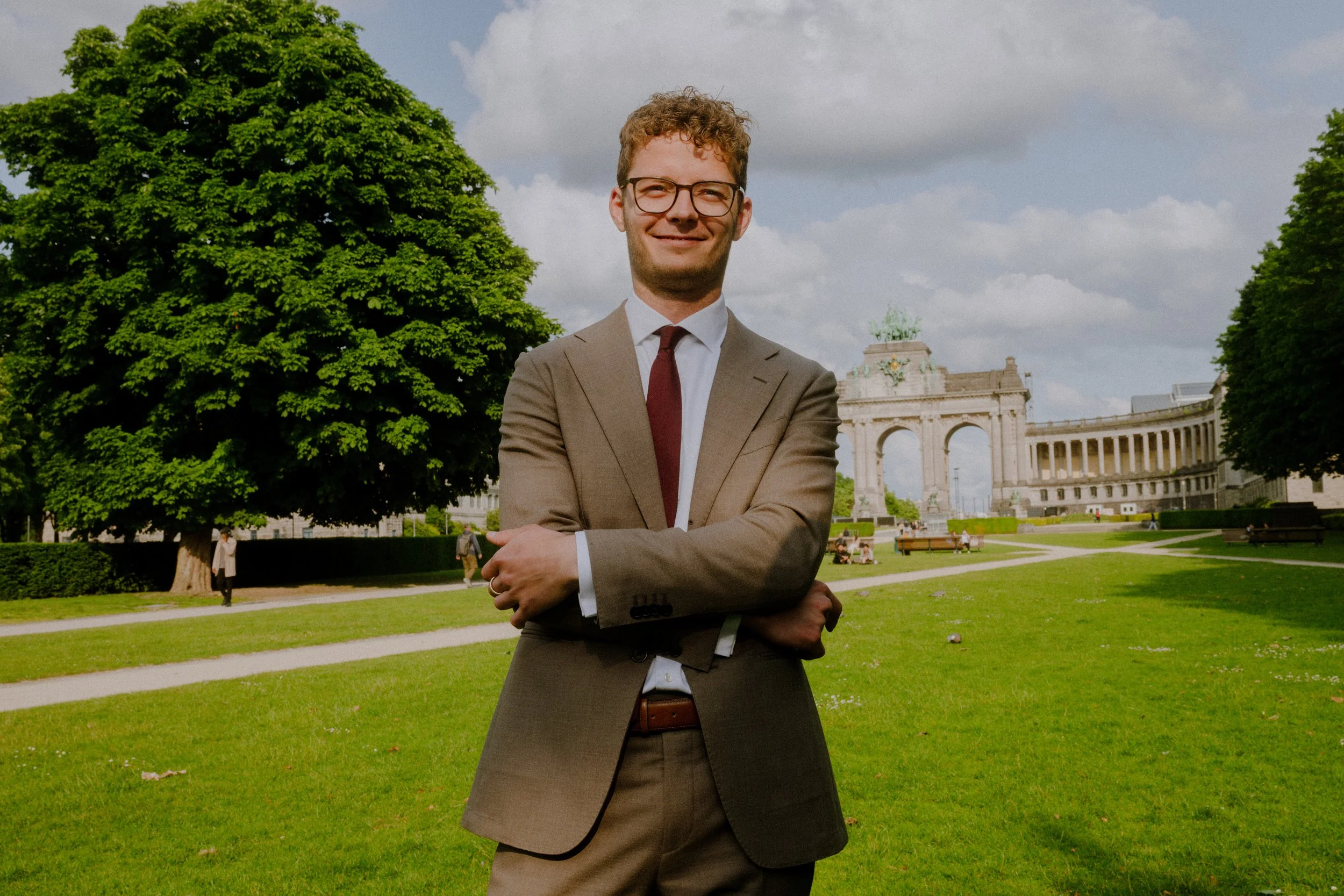Named after Tom Lantos, who initially arrived in the United States on a scholarship and later became a professor, the Lantos Congressional Fellows program honors his deep-seated belief in the power of education and the value of life-long learning.
Lantos Fellows are carefully chosen from a select group of post-college and post-graduate level students from Europe and Israel. Through fellowships hosted by U.S. congressional offices, they have the opportunity to work in the United States and gain a better understanding of the role of human rights in American politics and the legislative process.
More than 100 fellows have participated in the program from countries including Belgium, Bosnia-Herzegovina, Denmark, France, Germany, Greece, Hungary, Ireland, Israel, Italy, the Netherlands, Norway, Scotland, Sweden, Turkey and the United Kingdom. Nearly 50 congressional offices have hosted Lantos Fellows, and the program is fully bipartisan – both Republican and Democratic offices host Lantos Fellows.
Antonia-Laura Pup
City/Country of origin: Timișoara, Romania
Languages spoken: Romanian, English, French, Czech (beginner)
University degree(s) and any honors received:
· Included in the Forbes 30 under 30 Romania list in 2020 for my service as the President of the National Students’ Council of Romania
· Graduated in 2023 as a valedictorian with a bachelor’s degree in history from the Faculty of Letters, History, and Theology at the West University of Timișoara, Romania
· Awarded the Eiffel Scholarship (the most competitive scholarship of the French Ministry for Europe and Foreign Affairs awarded to international students)
· Awarded the Fulbright Scholarship from the U.S. Department of State
· Master’s degree in international security at the Paris School of International Affairs, Sciences Po: My dissertation, focused on China’s influence in the Black Sea region, was published by the Sciences Po digital library as one of the best dissertations defended in my program.
· Master’s degree in national security studies at Georgetown University as a Fulbright scholar, served in the Security Studies Program Student Council and as an editor for Europe and Central Asia at Georgetown Security Studies Review
3-4 top professional experiences/achievements:
· Drafted and passed legislation assuring that Romanian school students commuting to school have access to free transportation
· Draftedlegislation banning Confucius Institutes in Romanian universities
· Staffed the Vice-Chairman of Romania’s first Special committee in Parliament focused on ending human trafficking in our country
What unique experiences and perspectives do you hope to bring to the congressional office where you will be working?
I’m the only European in my office, which makes me uniquely positioned to examine China’s malign influence on our continent. I am also currently examining China’s multifaceted toolkit in the context of the war in Ukraine, as Beijing is (as per the NATO allies agreed in Washington in 2024) a decisive enabler of Russia’s war machine in Europe. Recently, I contributed to the writing of an oversight letter directed to Secretary of State Rubio in which the Ranking Member argues why China should not be granted the status of a security guarantor in the aftermath of the war in Ukraine.
What is your dream job? How do you think being a Lantos Fellow will help you on your career path?
While I do not have a specific dream job, I know I want to go back to my homeland, Romania, join the public service, and apply there all the wonderful lessons I have learned as part of this fellowship, including how we can improve the accountability and transparency of our institutions.
If you could have dinner with any human rights figure (living or deceased), who would it be? What would you talk about or what would you ask them?
Ion Rațiu was a Romanian lawyer, diplomat, writer, and politician, leader of the Christian Democratic National Peasants' Party, a landmark figure of Romanian democracy in the post-1989 era. I would choose Mr. Rațiu, who is arguably the best president that Romania never had, without hesitation. He left us with a very elegant definition of democracy: I will fight to my last drop of blood so that you have the right to disagree with me! If possible, I would want to ask him how he would chart Romania’s future in the international arena, and how can we use our success story as members of the EU and NATO to inspire others in our neighborhood and position ourselves as norm entrepreneurs in the region.
Wouter van Bodegraven
City/Country of origin: Alphen aan den Rijn, Netherlands
Languages spoken: Dutch, English, German, Spanish, French
University degree(s) and any honors received: MA Climate Politics & Economics, Columbia University; BA Political Philosophy, Leiden University; BA Propedeuse Journalism, Christian University of Applied Sciences Ede; MBO4 Bachelor Mechanical Engineering, LiS; Fulbright Award, 2023; Columbia University Merit-Based Scholarship, 2023
3-4 top professional experiences/achievements:
One of my proudest accomplishments came while working in the Cabinet of the European Commissioner for Climate, where I had a small role in the negotiations and rollout of the 2030 climate targets, the accumulative target of 27 member states following a very long process of negotiations. As someone who has long been wanting to do something good with my life, also spending a lot of time working on climate issues and all the problems and humanitarian disasters that come with it, the opportunity to work on the rollout of climate goals that not only put forward legal constraints on emissive industries but also work to transform them, and on an EU level, is something I never thought possible during my early career. I cherish it all the more for it.
Another achievement I hold personally close concerns a research project I was lucky enough to do during my time as a Fulbright Scholar. I researched the supply chains of critical minerals in the Congo and how bigger economic movement and geopolitical behavior is driving actors to the mining regions of the Democratic Republic of Congo, leading to a multiplicity of human rights violations in a region where they are already common. I will not claim I was successful in delivering a groundbreaking article that now serves as a benchmark for due diligence around mining practices, but through my work I was able to interview both officials and locals of the region who have suffered the brunt of large-scale violations by state and non-state actors. Having been able to give them a voice is something I hold dear.
Previously having worked within the Dutch banking sector, I left my job to continue working for Dutch Parliament after seeing how due diligence practices were predominantly focused on minority groups and profiling people within the fringes of the law. I am and will always be strongly opposed to any such practices and within my function for Parliament I set out to change the regulatory practices within the sector. Here, too, I don’t claim to have changed the sector on my own, but I did manage to get the word across during my time there and do everything I had the power to do to prevent such discriminatory practices becoming codified and legalized common practice.
What motivated you to apply for the Lantos Fellows Program?
My motivation to apply from the program coincided with a bit of luck, stumbling upon the program itself during a random internet search for my next challenge. I have spent time in the US before, studying at Columbia University in New York, and have both before and since been active in international politics as well. I felt naturally drawn to the program given that history, but also because US politics – and geopolitics for that matter – is getting to an increasingly difficult spot where newly erected walls drown out the voices of dialogue in favor of hard-core realpolitik. I wanted to take the opportunity to go to Congress and see for myself how US politics is fairing these days, as well as to further learn where cooperation is still in effect and where more is possible. It draws from a desire I have to do something meaningful with my life, the Lantos Fellows Program is making this possible and more, giving me the access and space to work directly within Congress and expand that increasingly narrow path of cooperation that exists and is so crucial to the big issues of our time, whether climate, defense, economics or human rights, often flowing interchangeably between each other.
What are you most looking forward to during your fellowship?
Quite frankly, everything and all things. I look forward to learning the ins and outs of Congressional legislative work, of authoring and co-sponsoring bills that have a genuine impact and hopefully pass the partisan divide. I look forward to connecting with the people and colleagues around, as well as seeing the Capitol building itself in its grandeur. But I also very much look forward to spending the sunny autumn days strolling through the parks, and its rainy days exploring the vast amount of (free!) Smithsonian museums. I am looking forward to the lunch conversations organized by the Lantos Foundation with human rights defenders and extraordinary individuals and professionals alike. And my own guilty pleasures, I look forward to American food portions, they do fit me better than the albeit healthier European counterparts!
What do you hope to learn or gain from your time as a Lantos Fellow?
I hope mainly to observe, learn and if at all possible, to contribute something within the team I am a part of. Whether that might be the introduction of a bill, the restoration of much needed international aid funding, or perhaps something as simple as the formation and execution of a hearing or roundtable, connecting my own EU background with US congress to further common goals. I am sure the experience will be extremely rewarding, no matter what content and knowledge I will pick up during my time here.
If you could have dinner with any human rights figure (living or deceased), who would it be? What would you talk about or what would you ask them?
There are a lot of people I could name here including Tom Lantos himself, but I would do myself an injustice if I did not say either Mahendra Ghandi or Martin Luther King. Their practices, voice and reach across history is admirable and unmatched. Few public leaders ever manage to move a country to such a degree it dramatically transforms itself, and fewer still have a voice so loud and peaceful they echo over time, with messages still relevant to us today - perhaps even more so than yesterday. I would ask them for the source of their conviction, the methods and practices they use not only to convey their message and how it moves people, but also their internal practices so I can learn from it. And lastly perhaps, if I could talk to them now, I would ask them for their advice and opinion during this moment in history.
What will you miss the most from your native country while you are living in America?
In the Netherlands, there is a 'limited' amount of proper Dutch food, as I have to admit we have the tendency to either deep fry, mash, or boil everything, preferably a combination of two out of three of those options. But one guilty pleasure I always take when back home, is something called a 'frikandel speciaal', which is this large shaped roll of mashed and deep fried meat (case in point), finished with a tad too much mayonnaise, curry and onion. Try it before you discard it!


